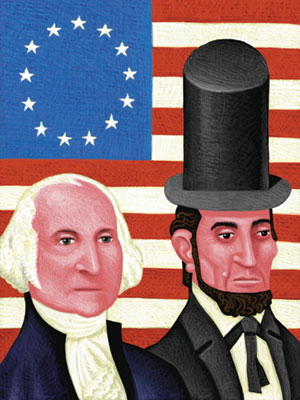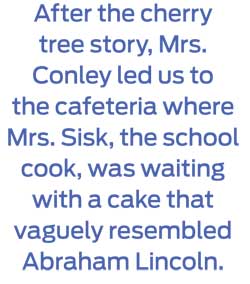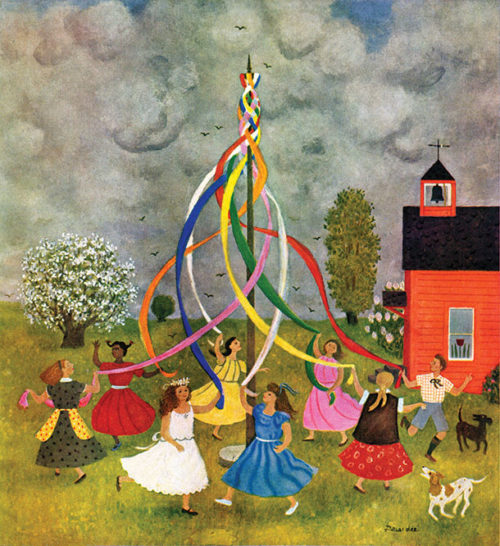Presidents Day

When I was in the fourth grade in Danville, Indiana, I had three teachers, Mrs. Conley, Abraham Lincoln, and George Washington. Mrs. Conley did the heavy lifting, instructing, grading our papers, and collecting our lunch money. Abraham Lincoln and George Washington stood ready to assist, peering at us from over the chalkboard, Father Abraham with his kindly countenance, George Washington with his face twisted up, prune-like, his dentures pinching, curious to see what his country had become. I think he was pleased with Mrs. Conley, her dignity, her unflappability, her keen intelligence. Then he looked at us and frowned, worried for the nation to which he had devoted his life.
This was back in the olden days, before we lumped all the presidents together into Presidents Day, giving Millard Fillmore equal billing with Messrs. Lincoln and Washington. Back then, we confined our tributes to Abe and George. Mr. Lincoln, a fellow Hoosier, received the lion’s share of our attention. Mrs. Conley read the Gettysburg Address while we thought of the war dead piled high on the Pennsylvania fields. Rachelle Wiggam, an unusually sensitive child, wept into her handkerchief, while Bernie Fender sprawled in his seat, felled by an imaginary bullet, feigning a soldier’s death.
Mrs. Conley told how George Washington cut down his father’s cherry tree, then confessed his misdeed, hoping to one day inspire schoolchildren with his honesty, and so he did, until Bernie Fender said, “I would have blamed it on my brother.” And then we thought maybe Bernie had a point and that George Washington wasn’t that smart after all. We had doubts about George Washington anyway, wondering why any self-respecting man would wear a wig.
After the cherry tree story, Mrs. Conley led us to the cafeteria where Mrs. Sisk, the school cook, was waiting with a cake that vaguely resembled Abraham Lincoln. I was a big fan of cake, but this felt cannibalistic, so I gave Rachelle Wiggam my piece, hoping she would remember my kindness when we were older and marry me and bear my children, one of whom would grow up to be the president of the United States and let us live in the White House where I could have cake anytime I wished and not just on birthdays.
After visiting the cafeteria, we returned to our classroom where Mrs. Conley told us about John Wilkes Booth shooting Abraham Lincoln in the theater.
“I thought he shot him in the head,” Bernie Fender cackled, and was sent to the principal, Mr. Peters, who looked a bit like George Washington, if George Washington had worn a flattop and farm boots.

Mrs. Conley told about Lincoln’s funeral train rolling through Lebanon, 21 miles north of us, on State Road 39. People lined the railroad tracks, the women weeping, the men removing their hats and bowing their heads, the children mute, holding their parent’s hands. Mrs. Conley spoke as if she had been there, and for a moment I thought perhaps she had. She was old, well into her 40s, but not old enough.
I asked Mrs. Conley if there were anyone alive who had ever seen President Lincoln.
She thought, then said, “Probably not. But there might be someone alive in our town whose parents did.”
I thought of Mr. Hoban who lived down the street from us and was so old he had fungus on his neck. After school I stopped by his house to ask if his parents had seen Lincoln’s funeral train. If so, they hadn’t told him. Then he showed me his military gear from World War I, and told me about the trenches at Flanders, but that didn’t strike my fourth-grade mind as interesting, so I excused myself and went home and watched Batman, who everyone knew was a genuine hero, even though he wore leotards, which no self-respecting man would do.
Maypole Memories

Several years ago, our town built a new elementary school, everything from the old school was hauled to the new, except for the playground maypole, which had been removed after flinging some kid into the next county. The maypole was the centerpiece of May Day, a holiday no longer recognized in our town after people noticed the communists were holding parades that day and deep-sixed it. But Mrs. Conley, my fourth-grade teacher, wasn’t cowed by capitalists or communists, so marched us to the maypole, where we welcomed spring. The most agile boy trailing streamers of ribbon would shinny up the pole, tie them off at the top, then slide back down. We would take the ribbons in hand, extend them straight like spokes on a wheel, and parade in a circle, earths of humanity orbiting our maypole sun. Mrs. Conley would recite from William Wordsworth’s poem “Lines Written in Early Spring”:
The birds around me hopped and played,
Their thoughts I cannot measure:—
But the least motion which they made
It seemed a thrill of pleasure.
By then it was lunch and we would file inside to the cafeteria where Mrs. Sisk had been cooking all morning. In concession to spring, our thrill of pleasure was ice cream for dessert, eaten with flat wooden spoons that left splinters on our tongues. I sat next to Stevie Wright, who was lactose intolerant long before the phrase had been coined. For the sake of his health, I would eat his ice cream, too.
May Day signaled the first day of recess baseball. Mrs. Conley would carry the bats and balls out to the playground, then leave us to divide into teams and play. Today, adults insert themselves into the game to coach and umpire, to keep things on the up-and-up, but Mrs. Conley believed in free-range baseball, in letting us settle matters ourselves, first yelling and screaming, then lowering our voices, giving here, taking there, seeking common ground. Workers of the world uniting, just like the communists.
I was chosen near the end, an obvious burden to any team, so while playing right field would drift unnoticed to the maypole. Other boys would be there, running in circles, lifting off their feet, riding the currents of centrifugal force like the hopping birds of Wordsworth’s poem.

Doris Lee
The Saturday Evening Post
May 4, 1946
Occasionally, a boy would let loose and take flight, landing in a bloody skid on the gravel that covered the playground. Today, playgrounds are covered with shredded rubber to ensure soft landings, but back then we understood the gravel as a metaphor, that high flying eventually resulted in rough landings.
When I was in high school, I dated a girl who lived a block from the school. In the spring of our romance, we met there and swung, side by side, hardly talking. She was shy and I was scared, knowing talk was expected. Instead, we would see how high we could swing, arcing back and forth until the chains were parallel to the earth. The chains would sag and we would feel weightless, descending until the chains caught tight, jerking and twisting us. Now those lines written in early spring are faded, replaced by fresher lines since written.